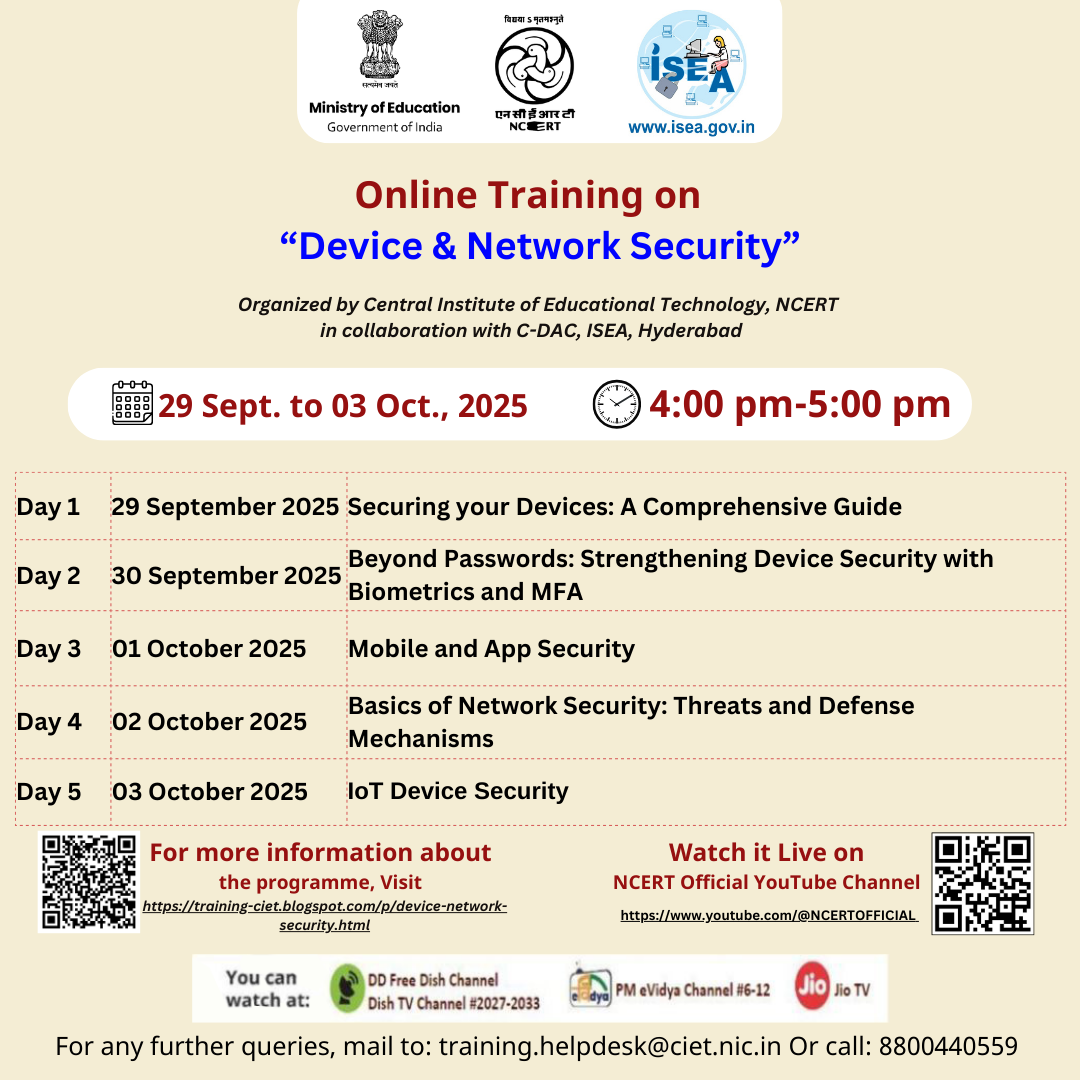
Online Training on
"Device & Network Security"
Digital devices and networked platforms have become the lifeline of modern education, shaping how learners
access knowledge, interact with peers, and engage with institutions. From virtual classrooms to
administrative systems, the educational process is now deeply dependent on secure technological
infrastructures. Yet this reliance also exposes schools and universities to threats such as unauthorized
access, data breaches, and service disruptions. Within this context, device and network security emerges not
merely as a technical requirement but as a pedagogical and institutional responsibility, ensuring trust,
continuity, and resilience in digital learning.
The growing frequency of cyberattacks, ranging from phishing and ransomware to denial-of-service incidents,
underscores the urgency of this issue. Such threats extend beyond technical inconvenience, jeopardizing
privacy, academic integrity, and even the psychological wellbeing of learners. Preventive measures such as
timely software updates, strong authentication protocols, and encrypted communications must therefore become
foundational practices. Equally critical is fostering awareness among students and educators, who often
remain the most vulnerable entry points for malicious actors. By cultivating informed digital habits,
institutions can reduce risks while empowering learners to navigate technology with confidence.
While individual practices provide the first line of defense, device and network security must ultimately be
embedded within the institutional ethos of schools and higher education systems. Secure Wi-Fi environments,
firewalls, and clearly defined policies for access and accountability are not optional safeguards but
structural necessities. The responsibility of institutions is not only to provide technical protections but
also to nurture a culture of vigilance, where all stakeholders view digital security as a shared
responsibility. In this way, education systems can move from reactive responses to proactive strategies that
protect learners and sustain academic credibility.
This training programme on “Device & Network Security” seeks to address these imperatives by enhancing the
professional competence of teachers, school leaders, and administrators. Through conceptual clarity and
practical strategies, it aims to equip participants with the knowledge and tools to secure digital
infrastructures, model responsible device use, and sustain safe, inclusive, and future-ready learning
environments. By embedding security as a core component of 21st- century education, schools can ensure that
learners thrive confidently in a networked world.
Aligned with the vision of the National Education Policy 2020, this five-day online training programme
organised by CIET-NCERT in collaboration with C-DAC, ISEA, Hyderabad, aims to build a comprehensive
understanding of device and network security as a critical foundation for safeguarding digital
infrastructures, protecting learners, and enabling secure, future-ready schools. The
English version
of the training will be conducted from 29 September- 03 October 2025, and the
Hindi version from 06- 10 October 2025, with live sessions scheduled daily
from 4:00 pm to 5:00 pm. This initiative brings together foundational insights and forward-looking practices
to support the meaningful integration of security, resilience, and accountability into the teaching–learning
process.
The sessions will be broadcasted live on NCERT’s Official YouTube Channel and simulcast on
PM eVidya DTH TV Channels (6–12) and the Jio TV mobile application.
Participants will also be able to access recordings through a dedicated YouTube playlist, enabling them to
revisit key discussions, consolidate learning, and translate knowledge into effective practice within their
own professional contexts.
Objectives of Training:
After completion of the training series, the learner will be able to:
- To understand key concepts and challenges of device and network security.
- To identify cyber threats and explore effective preventive safety strategies.
- To encourage responsible device usage among teachers, students, and administrators.
- To examine institutional policies ensuring secure networks and accountable practices.
- To apply practical strategies for fostering safe, resilient digital learning environments.
Program Schedule:
| Date & Time | Title of the Sessions | Name of the Resource Persons | Banner Link | Presentation link | Video Link |
|---|---|---|---|---|---|
|
Day 1: Monday, 29 September, 2025 |
Securing your Devices: A Comprehensive Guide | Mr. Himanshu Shekhar Project Engineer, C-DAC, Patna, Bihar | Day 1 | Presentation-1 | Video |
|
Day 2: Tuesday, 30 September, 2025 |
Beyond Passwords: Strengthening Device Security with Biometrics and MFA | Ms. Kajal Kashyap Project Engineer, C-DAC, Noida, U.P. | Day 2 | Presentation-2 | Video |
|
Day 3: Wednesday, 01 October, 2025 |
Mobile and App Security | Mr. Venkat R Kodimela Project Manager, C-DAC, Hyderabad | Day 3 | Presentation-3 | Video |
|
Day 4: Thursday, 02 October, 2025 |
Basics of Network Security: Threats and Defense Mechanisms | Mr. Harpreet Bawa Project Manager, C-DAC, Mohali, Punjab | Day 4 | Presentation-4 | Video |
|
Day 5: Friday, 03 October, 2025 |
IoT Device Security | Ms Sumera Farooq Project Engineer, C-DAC, Mohali, Punjab | Day 5 | Presentation-5 | Video |
|
Organising Team: Programme Advisory: Prof. Indu Kumar, Head, DICT, Central Institute of Educational Technology (CIET), NCERT, New Delhi. Programme Coordinator and Course Coordinator : Dr. Angel Rathnabai, Associate Professor, Central Institute of Educational Technology (CIET), NCERT, New Delhi. Technical Coordinator: Mr. Somesh Kumar, Junior Project Fellow, Central Institute of Educational Technology (CIET), NCERT, New Delhi. |
|||||
How to participate?
Step 1 : Registration :
Participants need to register using the following link or the QR code -
https://docs.google.com/forms/d/e/1FAIpQLSf2uSAx4OGK0m5KqCMOHZIRdlRU57KQ1Kt0gZ-m6n5ELIcZqw/viewform?usp=header
or scan the QR code -
Step 2 : Watch live sessions and learn about the topic :
Participants have to attend
training sessions, which will be live-streamed on NCERT Official
YouTube channel - http://youtube.com/ncertofficial from 29 September- 03
October, 2025 from 4 PM to 5 PM.(Monday to
Friday)
The session will also be telecasted live on the following :
- PM eVIDYA Channels #6-12
- DD Free Dish Channel
- DISH TV Channel #2027-2033
- Jio TV mobile app
If anyone has missed the live sessions, they can watch the recording using the playlist link: https://youtube.com/playlist?list=PLcsj1x9n9h4iAUJMEoyU7raiXzxwVN6sj&si=FBbHxBgOFZz6UvNg
Step 3 : Take up the online course, participate in post-assessment, and get certified :
Those who are interested in getting a certificate, they need to do the following:
- Join the online course on the DIKSHA portal.
Course link: https://learning.diksha.gov.in/diksha/course.php?id=860§ion=1877
This course will be open till 15 March 2026. - Participants need to join the course, go through all the five videos.
- Participants need to take up the final assessment. Participants can attempt thrice the assessment.
- Participants who score 70% and above in the final assessment will get a certificate and they can access their certificate in their DIKSHA profile page itself. It may take 15-20 days to receive the certificate.
Step 4 : Submit Feedback : Participants are expected to submit feedback using the link or QR code
-
https://docs.google.com/forms/d/e/1FAIpQLSedcfFgQxLhP4GmgOBIvcPccStIQ_I_bJjWz9FM1jdszSQkHw/viewform?usp=header
or scan the QR code-
This feedback form is intended to know participants' experiences, learning, and suggestions regarding the online training. This will help us in further improvement of the virtual training process.
For any queries, mail to : training.helpdesk@ciet.nic.in or call: 8800440559.


